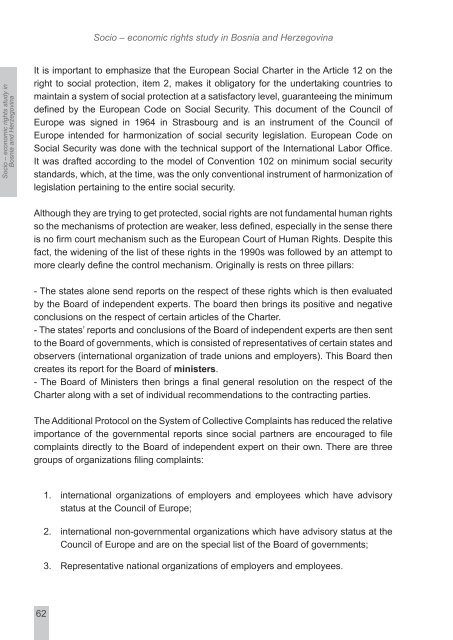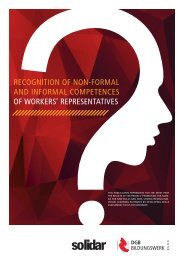ZAÅ TITA PRAVA U BOSNI I HERCEGOVINI - Solidar
ZAÅ TITA PRAVA U BOSNI I HERCEGOVINI - Solidar
ZAÅ TITA PRAVA U BOSNI I HERCEGOVINI - Solidar
You also want an ePaper? Increase the reach of your titles
YUMPU automatically turns print PDFs into web optimized ePapers that Google loves.
Socio – economic rights study in Bosnia and Herzegovina<br />
Socio – economic rights study in<br />
Bosnia and Herzegovina<br />
It is important to emphasize that the European Social Charter in the Article 12 on the<br />
right to social protection, item 2, makes it obligatory for the undertaking countries to<br />
maintain a system of social protection at a satisfactory level, guaranteeing the minimum<br />
defi ned by the European Code on Social Security. This document of the Council of<br />
Europe was signed in 1964 in Strasbourg and is an instrument of the Council of<br />
Europe intended for harmonization of social security legislation. European Code on<br />
Social Security was done with the technical support of the International Labor Office.<br />
It was drafted according to the model of Convention 102 on minimum social security<br />
standards, which, at the time, was the only conventional instrument of harmonization of<br />
legislation pertaining to the entire social security.<br />
Although they are trying to get protected, social rights are not fundamental human rights<br />
so the mechanisms of protection are weaker, less defi ned, especially in the sense there<br />
is no fi rm court mechanism such as the European Court of Human Rights. Despite this<br />
fact, the widening of the list of these rights in the 1990s was followed by an attempt to<br />
more clearly defi ne the control mechanism. Originally is rests on three pillars:<br />
- The states alone send reports on the respect of these rights which is then evaluated<br />
by the Board of independent experts. The board then brings its positive and negative<br />
conclusions on the respect of certain articles of the Charter.<br />
- The states’ reports and conclusions of the Board of independent experts are then sent<br />
to the Board of governments, which is consisted of representatives of certain states and<br />
observers (international organization of trade unions and employers). This Board then<br />
creates its report for the Board of ministers.<br />
- The Board of Ministers then brings a fi nal general resolution on the respect of the<br />
Charter along with a set of individual recommendations to the contracting parties.<br />
The Additional Protocol on the System of Collective Complaints has reduced the relative<br />
importance of the governmental reports since social partners are encouraged to fi le<br />
complaints directly to the Board of independent expert on their own. There are three<br />
groups of organizations fi ling complaints:<br />
1. international organizations of employers and employees which have advisory<br />
status at the Council of Europe;<br />
2. international non-governmental organizations which have advisory status at the<br />
Council of Europe and are on the special list of the Board of governments;<br />
3. Representative national organizations of employers and employees.<br />
62
















